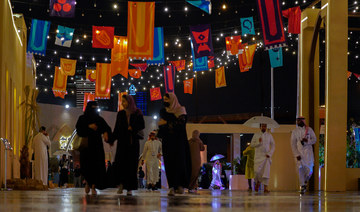CAIRO: For more than 25 years, football tournaments have been among the most popular of the special events in Egypt associated with the holy month of Ramadan.
They began when groups of friends would gather together to organize matches so that they could indulge their passion for the game and show off their skills. But as the years have passed they have become more organized and professional, in some cases even attracting the attention of major sponsors.
The growth of these Ramadan soccer competitions can be traced back through the years to humble beginnings in the neighborhoods of Cairo before they expanded to other parts of the country and then elsewhere in the Arab world. Along the way, they moved from the streets to youth centers and, eventually, major sports clubs.
“The Ramadan football tournaments first started in the streets of the capital, where players had to be self-reliant,” Mohammed El-Sayed, a sports journalist with Egyptian newspaper Akhbar El-Youm, told Arab News.
“Youths from different regions would organize their own teams and rounds within each region. They took the streets as their stadium and there were no uniforms involved; the team unity alone was enough.
“In the past, Ramadan football tournaments were always played immediately before iftar. Young people took advantage of the quiet streets at that time to hold matches, while children and young adults gathered around to watch them as a form of entertainment.”
Hatem Hussein, also known as Mizo, is one of the best-known players who took part in Ramadan tournaments during the 1990s.
“I was playing in the streets (back then) and we were all very eager to play … the competition was strong,” he said. “We always adopted the knockout matches method: The team that eliminated all its competitors until the end of the tournament would be considered the winner.
“The prizes were symbolic and reflective of the entry fee that the teams paid at the beginning. Second and third place both took home a complete sports kit.”

The growth of these Ramadan soccer competitions can be traced back through the years to humble beginnings in the neighborhoods of Cairo before they expanded to other parts of the country. (Supplied)
Karim Al-Bibani, an organizer of Ramadan tournaments in the Abdeen area, near the center of Cairo, said: “These matches were initially played on the streets of Cairo, on the cold, hard asphalt, but around the year 2000, youth centers started to host them on well-equipped pitches.
“In part, this was a result of the large number of housing units that were being built, which left little or no space for playing football on the streets.
“The tournaments have now moved to youth centers because of their good playgrounds, strong lighting and better capabilities. These centers organize the tournament and are responsible for it, financially.”
As the popularity of the seasonal competitions grew and spread, it was no surprise that established football clubs wanted to get in on the act.
“In the past 15 years, Ramadan tournaments began to move to major clubs, and a number of great players who had retired from their clubs began to play in these tournaments,” said sports journalist El-Sayed. In particular, an increase in the number of five-a-side pitches with artificial grass that were being built helped to fuel this trend, he added.
“The participation of the retired players is the reason Ramadan tournaments started to expand outside Egypt,” El-Sayed said.
As a result of these popular veteran stars taking part, in recent years Ramadan tournaments have increasingly become big business, attracting lucrative sponsorship deals, said journalist Mahmoud Essam
“For the big clubs, sponsorship will be at a higher level, including real estate and mobile phone companies, among others,” he said. “These sponsorships depend on having big names participating in these tournaments.”


























